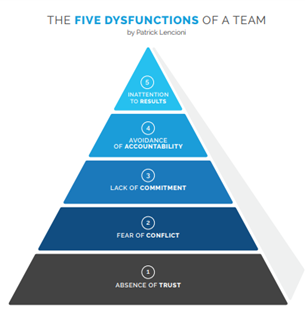How often do you see a doctor to check up on your health? Maybe once a year? Or when you’re forced to stop ignoring the problem? People are not healthy all the time. The same is true for your team health. We’ve all got a little ‘dysfunction’ to work on.
To go farther faster, it’s crucial to have a healthy team and know what needs sharpening.
How Healthy is Your Team?
Plot your team on the chart below. Does anything stand out as something to do a team checkup on?

Figure 1: The Five Dysfunctions of a Team (Lencioni, 2021)
In his book, The Five Dysfunctions of a Team, Patrick Lencioni explains why it’s rare to have a highly functional team and provides specific recommendations for eliminating barriers that lead to dysfunction.
The Five Dysfunctions and How to Overcome These Barriers:
- Absence of Trust:
The absence of trust occurs when teams hide weaknesses and mistakes from each other. Team members are hesitant to provide feedback or ask for help. They will hold grudges, jump to conclusions, and avoid spending time together.
To overcome - Trust, being at the bottom of the pyramid, is the most important to have with your team. When trust is broken, it’s hard to get back. Trust needs to be nurtured. Teams build trust by giving each other the benefit of the doubt, appreciating each other’s skills, offering, and accepting apologies.
On a scale of 1-5, what’s your trust score?
- Fear of Conflict
Teams with this dysfunction tend to ignore controversial topics. They tend to have boring meetings and can fail to understand the entire team’s opinions and perspectives.
To overcome - Team members must tap into effective confrontation by putting critical topics on the table. They should create more lively meetings and gain all perspectives and ideas to solve real problems in reaching team goals.
How comfortable is your team with healthy conflict?
- Lack of Commitment
The middle tier of the pyramid, this dysfunction describes teams who fear failure, lack strong decision-making skills, and overanalyze processes causing unnecessary delays.
To overcome – Set clear deadlines and directions on how and when decisions are made. Do not place rely upon consensus. If you need to, set contingencies!
What’s your commitment to commitment?
- Avoidance of Accountability
Dysfunction around accountability occurs when team members have different standards for performance and place the burden on the group leader to discipline.
To overcome – Your team is only as accountable as you hold yourself. Hold each other accountable, use reward mechanisms, and be transparent on the policies and standards of team performance.
How high is your level of accountability?
- Inattention to Results
Teams that don’t pay attention to results become easily distracted, fall short of competitors, and fail to grow.
To overcome – What gets measured gets attention. Discuss your scorecard and key performance indicators weekly.
What are you measuring?
How Do You Fix a Dysfunctional Team?
There is no easy button to “fix” a dysfunctional team, so it’s essential to start by addressing the root causes at the different levels of the pyramid. Establishing a baseline of trust will create a snowball effect. Creating an environment where open communication and feedback will help you thrive as a team.
Just remember, most teams lie somewhere on the dysfunctional pyramid. An easy way to break through a new stage is to start with an open conversation about what stage you are in.
Learn more about Acumen’s leadership culture and how you can use your platform to create a lasting impact for your team.
Lencioni, P. (2021). The Five Dysfunctions of a Team, Digital image, Executive Agenda. Accessed 10, March 2022. https://www.executiveagenda.com/resources/blog/five-dysfunctions-team


Comments